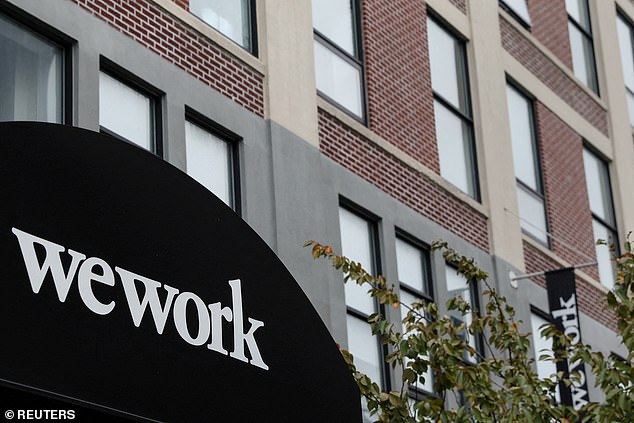Disgraced WeWork founder Adam Neumann finally gives up on trying to buy the company back
Ousted WeWork founder Adam Neumann has ended his bid to buy back the company after it filed for bankruptcy in November.
The 45-year-old claimed the coworking company chose to emerge from bankruptcy with an ‘unrealistic’ plan, according to The New York Times Deal Book.
Neumann’s new real estate company, Flow Global, submitted a more than $500 million bid earlier this year to acquire WeWork and its assets.
“For several months we have sought to work constructively with WeWork to create a strategy that would allow it to thrive,” Neumann said in his statement.
“Instead, the company appears to be emerging from bankruptcy with a plan that appears unrealistic and unlikely to succeed.”
Ousted WeWork founder Adam Neumann has ended his bid to buy back the company after it filed for bankruptcy in November
WeWork, once valued at $47 billion on paper, ousted Neumann as CEO in 2019 amid scathing criticism of his leadership and “tequila-driven” lifestyle.
He did not immediately respond to a request for comment and WeWork, once privately valued at $47 billion, declined to make a statement.
He previously said that WeWork has declined to enter into talks, instead using the bankruptcy lawsuit to strike a deal that would transfer control of the company to “chosen buyers.”
Neumann worked with hedge funder Dan Loeb in his bid to recapture the company, but accused WeWork of stonewalling the bid, according to a legal letter.
“We are writing to express our dismay at WeWork’s lack of involvement even in providing information to my clients in what is intended to be a value-maximizing transaction for all stakeholders,” wrote Neumann’s attorney Alex Spiro.
Founded in 2010, WeWork aimed to revolutionize the office market by renting out large properties on longer leases and then leasing them to multiple smaller companies looking for flexible workspaces for shorter arrangements.
Initially seen as a disruptor, with a business model unencumbered by real estate ownership, WeWork expanded rapidly.

Neumann claimed that the coworking company chose to emerge from bankruptcy with an “unrealistic” plan

Neumann’s new real estate venture, Flow Global, submitted a bid of more than $500 million earlier this year to acquire WeWork and its assets
But the company’s cash burn left it unable to pay its debts.
With more than $13 billion in long-term leases, it filed for Chapter 11 bankruptcy protection in 2023 to renegotiate these agreements.
Neumann was ousted in 2019 after a failed attempt to take the company public, amid growing investor concerns about losses and his leadership.
Major financial banker SoftBank initially offered Neumann a severance package worth $1.7 billion, but reneged on the deal and ultimately paid him about $445 million in cash and stock, according to the Wall Street Journal.
After listing in 2021, WeWork suffered losses on its long-term lease obligations as more people started working from home during the pandemic and demand for office space plummeted.
Shortly before WeWork filed for bankruptcy in November, Neumann said in a statement: “I believe that a reorganization, with the right strategy and team, will enable WeWork to become successful.”
WeWork is rationalizing its real estate portfolio to reduce rental obligations.
Last week, it said it has determined a path forward on more than 97 percent of its wholly owned lease portfolio and expects to reduce total lease obligations by more than $11 billion.
